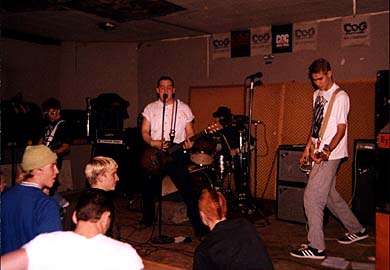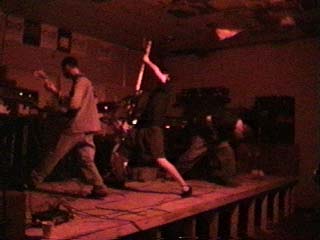The man who made a home for punk rock in Omaha quietly decides it's time to find a new home for himself in Portland.

The man who made a home for punk rock in Omaha quietly decides it's time to find a new home for himself in Portland. |
The Fonzarellies tear it up at the Cog Factory. |  |
The Ultimate DIY Guy Says Goodbye
| by Tim McMahan | Sidebar: Now who runs the |
| "Punk
isn't a way you look or act, it's what you think," says Robb Rathe. And certainly no one embodies the word "punk" like Rathe. At the age of 24, he has applied his Do IT Yourself (DIY) attitude to make a haven for gritty, urban rock, while at the same time, creating a business by taking twisted, discarded pieces of industrial-strength metal and welding them into functional works of art. "If you're not satisfied with what's provided, you do it yourself and have no concern for criticism," he says, earnestly. "That's why someone who makes $10 million a year can be a DIY punk guy, as long as he's doing it his way." Rathe has always done it "his way" because no one else would. When he looked with a fixed gaze over the Omaha landscape for an outlet for his music and lifestyle, he found nothing. So he made his own punk rock scene that catered to a young spirit that he hopes he never loses, and knows that, in fact, he never could. Now Omaha will have to do without this ground-level visionary because, come next week, he'll be leaving for good, searching for new opportunities that he says Omaha can't provide "simply given the geography." It's the geography - a natural feature of the land - that Rathe has tried so hard to alter in Omaha's flat and featureless cultural landscape. His first step was creating the Cog Factory, a punk rock showcase located on Leavenworth Street in a rundown, unmarked office building. At age 19, Rathe (pronounced "Rath-ee") took loan money marked for a year's tuition at UNO and spent it on leasing and refurbishing the vacant building. He tore out all the wall space and flooring, and then, over the course of the Cog's six years of business, covered the walls with spray-paint, band stickers and show bills, hand-scrawled graffiti and egg carton acoustical tile. Some of the hardest, loudest, angriest punk bands have pounded the Cog's stud-and-plywood stage, including Seven Year Bitch, Brainiac, Jon Spensor Blues Explosion, mu330, Season to Risk, as well as local heroes Frontier Trust, Mercy Rule, Full Blown, the Protoculture, and a slew of others. "It's something that happens in every other city in the United States and needed to happen here," Rathe says. "I have a love for the people involved in Omaha's music scene and a respect and understanding for the 'kids' of the age that typically come to a place like this. When people get older, they lose touch with who they were when they were that age, and that's ridiculous. "There seems to be this lapse of memory of, 'hey, I was once that age, too,'" Rathe says. "The lack of respect is just unacceptable. Everyone needs to be respected no matter how old they are. If the majority had it their way, they would build a youth center where kids would come to learn about 'the right way to grow up as an adolescent.' At the Cog Factory, we tell people, 'we respect you, respect us.' It's a place for people to display creativity and freedom of speech." |
"I have a love for the people involved in Omaha's music scene and a respect and understanding for the 'kids' of the age that typically come to a place like this. When people get older, they lose touch with who they were when they were that age, and that's ridiculous." |
| Though he's in his mid-20s, Rathe looks like he could still hold his own with the best of Omaha's skatepunks. He's a dark-haired version of Flea from the Red Hot Chili Peppers, with chopped cut, mustache and goatee. His thick tan skin, huge forearms and callused hands look as if they've seen years of hard work. He dresses in punk casual, with black dusty T-shirt, shorts and socks that cover part of a large black tattoo that runs down the calf of his left leg. He talks fast, as if he knows exactly what to say to convey what he feels about every topic, issue, or question, all with good smile. He's leaving Omaha to take a project management position at 24-7 Marketing, a Portland design and construction company that builds store interiors, displays and trade show booths for sports and apparel companies such as Nike and Biirkenstock. His background in project management came from four years experience in the Army Corp. or Engineers. But his design experience comes from a lifetime of building things on his own. "I used to tell my mom, 'Don't go out and buy stuff, I'll just make it myself,'" Rathe says. His ingenuity culminated in is his furniture company, "Rath-E Design," which he's run out of the Cog Factory for the past two years. By day, the mosh pit is crammed with welders and drill presses, cutting implements and scraps of razor-sharp steel filings. In the back shop area, steel cuttings like martial arts weapons are scattered cross worktables. Rathe says he's never been seriously cut, "but I've been burned a number of times." If you're reading this in the Old Market, there's a good chance you're sitting on or near a Rath-E creation. Check out the elegant brushed aluminum and cherrywood bar and fixtures at the Dora Maar Art Gallery and Espresso Bar, located on the second floor of the new shopping "mall" next to Wild Things. Recently, Rathe began working with master woodcrafter Barry Zimmerman. The two very different materials effortlessly compliment each other, mixing metal and wood in intricate, almost Art Nouveau patterns. You can almost imagine Rathe scratching the zigzag patterns on the surface of the sheet metal. The counters and seating at Shock, (the ultra-hip, ultra-cool juice-bar/second-hand clothing and gift store located in the Old Market) also sport brushed aluminum sheeting with black metal trim. The bar panels feature cut sheet metal designs like rusty-brown serpents. Off to the side, metal dining tables in geometric interlocking shapes stand mounted on metal rollers, along with high-back vented sheet-metal benches and wood-plank-topped tri-leg stools. Above the juice-bar's refrigerator hangs a triangle-shaped metal clock, bordered by a frame of wood studs. And at the new Blue Barn Theater (formerly the Bemis Gallery), Rathe has again designed a unique bar and counter, this time using among its elements metal bars that have rusted to look like bark-covered tree branches, like something out of Gilligan's Island. At your feet, chrome-metal clip lights with inviting blue bulbs. But that's only part of Rathe's work. A great deal of his furniture is created for private residential clients, which the public will never see. While kids wait for the bands to set up in the Cog Factory, they can try and get comfortable on a number of Rathe's creations, many of which were never meant to be sat on. One chair looks like a torture device constructed of discarded engine parts. Another has a backboard made of a shiny flat sheet of metal inwhich Rathe has painstakingly cut out large metal flames. |
| "Some of my furniture has zero function," he says. "I've made chairs out of rebar and motorcycle parts, some even have spikes. The furniture I've made for my house is more aesthetic than functional because I never sit down. If you have furniture that's uncomfortable, you have to stay on your feet." Rathe's influences: Conan, Mad Maxx, the Star Wars Trilogy and architect Frank O. Gehry, renowned for designing structures out of materials such as corrugated tin and chain link, as well as for his famous cardboard chairs. Rathe agrees that there is a post-apocalyptic feel about his furniture that comes from making necessities out of the discarded. His goal in life: To build or own a house in every state in the U.S. "My house in Omaha has taken five years to finish, so it could take me 250 years," he says. "Hopefully I'll be starting a house in Portland in a couple years. I want to construct it of used materials -- train cars, grain silos, some used steel, salvaged battleship parts. That's what needs to happen in architecture. We live in a time of overproduction. People are going into debt just to stay up with their excess." Rathe certainly never had a life of financial excess in Omaha. The Cog Factory has merely been self-sustaining, while Rath-E Design brought in enough money "to sustain the lifestyle that was comfortable for me," he says. "It made me happy and that's what's important." He says he's not leaving Omaha due to a lack of opportunities, but because he's lived here 25 years and wants to try something new. "I created the Cog Factory because I wanted a place to see the bands I love and there wasn't anywhere for them to play," he says. "The same holds true for my furniture company. I probably wouldn't have started it if there already was someone doing it." And Omaha will become whatever people make of it, he says. "It can be the best or worst place to live, but people have to do something about it. If something you want here doesn't exist, create it. It's the people who just complain about it that I don't give a shit about. That goes for every aspect of life. The people who make this country great are the ones who refuse to accept what's laid down before them." What he'll miss when he's gone? "My friends. There are so many good people here. The one thing I systematically hear whenever I go to another city is how nice the people of Omaha are. But the biggest thing in the world I'll miss is the people who have done so many favors and been so kind, especially over the past five or six years." Which brings it all back to the Cog Factory. Though Rathe leaves with a lot of memories, no one night or one event stands out. "Every once in a while the whole thing wore on me," he said of the Cog. "The constant work and financial strain, it could become a grind. But every time I thought about that, a week later we'd have a huge show. And I'd sit back and look over the heads of 250 kids who are entranced and think, 'How in the hell… why would I do something to keep this from happening?' That's my best memory." Originally printed in The Reader October 29, 1998. Copyright © 1998 Tim McMahan. All rights reserved.
|
 Turmoil at the Cog...
"Omaha can be the best or worst place to live, but people have to do something about it. If something you want here doesn't exist, create it. It's the people who just complain about it that I don't give a shit about." |